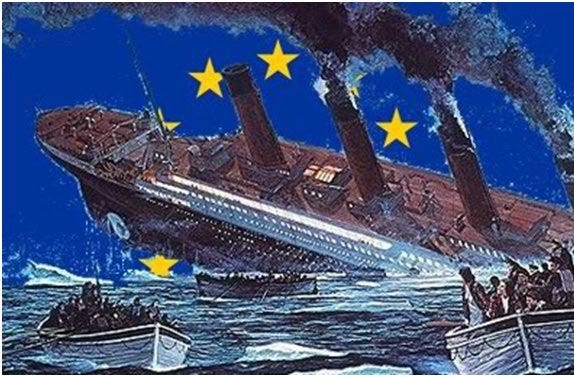At least when the Titanic went down the lights were on.*

From ZeroHedge:
Europe’s escalating economic, financial and geopolitical crises are putting increasing pressure on the whole EU project. They’re also unmasking the exalted “European unity” for the utter farce that it is. It’s become clear that like most other things in the empire of lies, that unity is exactly its opposite as allies turn against allies.
Destroying Germany’s economic lifeline
Someone blew up Nord Stream pipelines bringing in cheap, abundant natural gas from Russia to Germany. German economy depended on this resource for nearly 60% of its industrial production. As Zoltan Pozsar suggested, $2 trillion of German value depended on $20 billion of Russian gas.
We can’t be sure who blew up the pipelines,but the most likely suspects are all Germany’s supposed friends and allies: the US, UK, Poland, Sweden and Denmark. Of course, we are not talking about those nations’ legitimate government structures, but rather, the deep state elements within. One thing that is not in doubt however, is that Germany, not Russia, will sustain by far the greatest damage from the sabotage. That was fully well appreciated by all protagonists of this drama, implying that it was a deliberate and premeditated attack on Germany.
Adding insult to injury
For years, the US had pressured Germany to cancel the Nord Stream 2 pipeline and to cut its dependency on Russian gas. To persuade German leaders, their U.S. counterparts promised to replace Russian gas with American LNG shipments. As we now know, Germany’s “friends and allies” took advantage of German compliance by delivering natural gas at extortionate prices. According to an energy investment banker Laurent Segalen, US gas suppliers could load a large LNG tanker in the US at a cost of about $60 million per shipment. The cargo could then be sold for up to $275 million in Europe, thanks to the massive price disparity between the US and European markets: in the US, Natural Gas trades at less than $7/mBtu (million British thermal units) while Dutch TTF futures recently traded at over $60/mBtu.
Last month one of the key architects of this catastrophe, Berlin’s hapless Economy minister, Robert Habeck publicly complained about the situation in an interview to German media. Only yesterday, French economy minister Bruno Le Maire chimed in: “We cannot accept that our American partner sells its LNG four times the price at which it sells it to its own industries.” But these lamentations come far too late to mitigate the extreme damage to European economies.
Beseiged from all sides…
Thus, together with Poland’s bold demand for 1.3 trillion Euros in WW2 reparations, Germany has suddenly found itself besieged by its “friends” and “allies” on many fronts. Even though the reactions from Germany (apart from that Habeck interview) have been remarkably quiet, it is easy to imagine that Chancellor Scholz‘s telephone must be ringing off the hook with angry complaints from German industrialists and labor union leaders. As Hans Peter Wollseifer, president of the Central Association of German Crafts said to the Rheinische post, “Every day, we receive emergency calls from companies that are about to stop production because they can no longer pay the enormously increased energy bills.” The Federation of German Industries (BDI) also warned of a wave of bankruptcies due to energy cost inflation which is now a major challenge for 58% of companies while 34% believe that the crisis jeopardizes their very survival.
Germany has (potentially) one reliable partner....